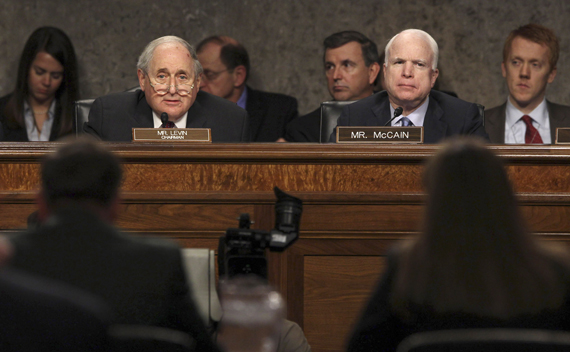U.S. Senators Weigh in on Futenma
More on:

Senators Carl Levin, John McCain and Jim Webb, all of the Armed Services Committee, have announced that they want a review of the Department of Defense realignment plans in Asia. After a visit to the region, including Okinawa and Guam, the senators declared the “present realignment plans are unrealistic, unworkable and unaffordable.”
This is a tough assessment, but not a surprising one. Concern about dwindling congressional support for the realignment plan has been growing here in Washington as the budget debate intensified. The stalled effort to build a new runway in the north of Okinawa for the U.S. Marines based at Futenma has not only frustrated Department of Defense planners. It has also raised serious concerns about the overall U.S. military posture in the region.
With the region becoming increasingly sensitive to Chinese military growth, U.S. allies watched the difficulties between the U.S. and Japan over Futenma relocation with considerable concern. To make matters worse, Japan’s devastating earthquake-tsunami on March 11 has also focused national attention (and resources) on the task of recovery, making it even less likely that Japan will be able to move the conversation with Okinawa forward.
The suggestions made in the Levin-McCain-Webb proposal are designed to bring down costs as well as bring to an end to the Futenma bottleneck. Their overarching goal is to reassure others in the region that the U.S. military presence is sustainable.
The recommendations are straight forward. But the politics of moving the U.S. Marines onto Kadena Air Force Base will not be. Kadena has two major runways, and is the largest American military base in the Pacific. For years it seemed the obvious destination for the U.S. Marine helicopters operating out of Futenma. Yet in 1997, this option faltered because of inter-service rivalry among the U.S. planners and local environmental concerns in Okinawa. Today, this idea has new challenges. The Japanese courts have awarded local residents in and around Kadena higher compensation for the noise generated by fighter jets and lowered considerably the legally acceptable threshold for noise.
But the time has come for Washington to openly review the plan. Recent revelations by Wikileaks of behind the scenes discussions between U.S. and Japanese officials regarding the Futenma stalemate revealed what many of us outside of government already understood: the deal that had been forged in 2006 no longer has the support of virtually everyone involved in cobbling it together.
Frustration over Futenma has sorely tested the relationship between Tokyo and Washington at a time when everyone wants to put an end to the problem. Senator Webb put it best: “what we need is a solution.” Let’s see if there is one.
More on:
 Online Store
Online Store
